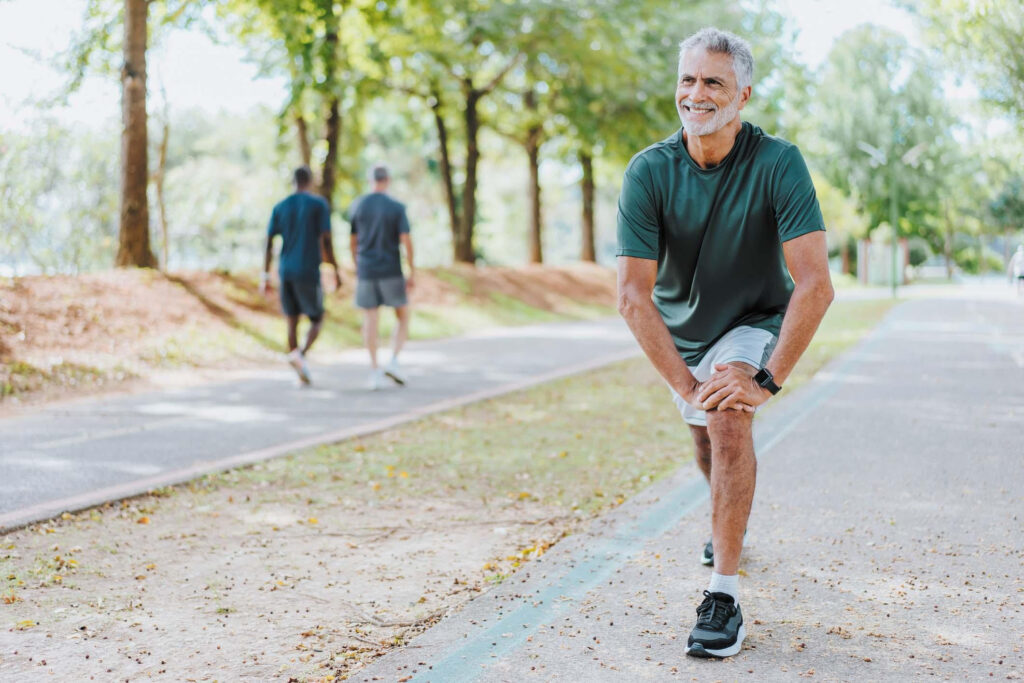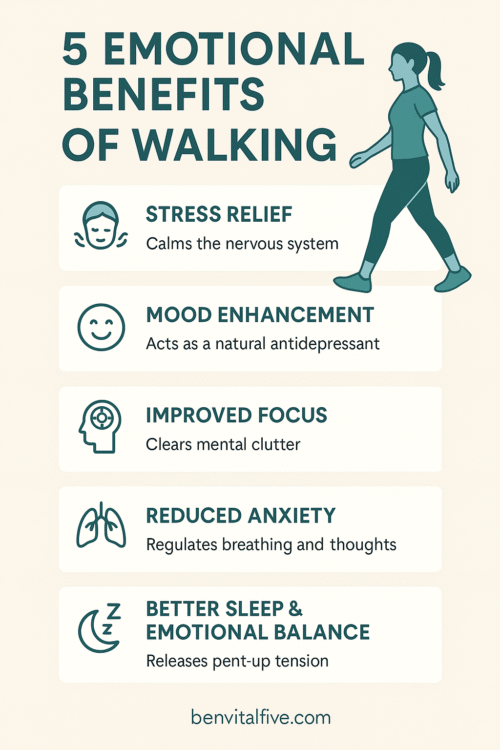Table of Contents
ToggleIntroduction:
The emotional benefits of walking are powerful—it reduces stress, lifts mood, clears mental clutter, and even strengthens emotional resilience. No wonder experts say movement is medicine. In this article, we’ll explore how walking transforms emotional wellness, how to make it a habit, and the best accessories to keep you motivated.
Walking is one of the simplest and most natural forms of exercise. It doesn’t require fancy equipment, gym memberships, or extreme effort. Yet, its impact goes far beyond physical health. Science and experience both tell us that walking can heal the mind just as much as the body.
Related Read: The benefits of Brisk walking to stay calm and live longer
Why Movement is Medicine
The phrase “movement is medicine” reflects the idea that physical activity is one of the most effective and natural treatments for emotional and mental struggles. Unlike pills or supplements, walking is free, accessible, and side-effect free.
When you walk, your body releases endorphins—natural mood boosters that help fight stress and anxiety. Regular walking also increases serotonin and dopamine, neurotransmitters linked to happiness and relaxation. Even a 10-minute stroll can have a measurable impact on your emotions.
Read Harvard Health’s guide on walking and mental health.
The Science Behind the Emotional Benefits of Walking

Walking has been extensively scrutinized regarding its psychological ramifications. Herein lies what scientific inquiry reveals:
- Diminishes Cortisol Levels: Walking effectively mitigates cortisol, the hormone associated with stress, anxiety, and tension.
- Enhances Creativity: Empirical evidence suggests that walking can significantly augment creativity and facilitate problem-solving capabilities.
- Augments Cognitive Function: Engaging in walking enhances cerebral blood flow, thereby sharpening focus and enhancing memory retention.Promotes Long-Term Psychological Well-Being: Consistent walking diminishes the likelihood of depression and fosters emotional wellness.
Key Emotional Benefits of Walking
1. Stress Relief on Demand
One of the most immediate emotional benefits of walking is stress reduction. Even a short 5–10 minute walk outdoors can calm your mind and bring perspective to overwhelming situations.
2. Natural Mood Enhancement
Walking acts like a natural antidepressant by triggering endorphins. Many people report a “mood boost” after even light walking sessions.
3. Better Focus and Productivity
Walking clears mental clutter, making it easier to focus on tasks. Many professionals now take “walking meetings” to think more clearly.
4. Reduced Anxiety
The rhythmic movement of walking, combined with deeper breathing, helps regulate nervous system activity and calms anxious thoughts.
5. Improved Sleep and Emotional Balance
Walking regularly improves sleep quality. Better sleep means better emotional balance and less irritability during the day.
Related Read: How to Achieve Your Wellness Journey : Embrace Balance,
Walking as a Tool for Emotional Wellness
Walking transcends mere exercise; it serves as a potent form of therapy.
Walking Meditation: Concentrating on breath and footsteps cultivates mindfulness.
Social Walking: Strolling alongside friends or family fosters deeper connections and alleviates feelings of isolation.
Solo Reflection Walks: Serene ambulations provide an opportunity for introspection and emotional rejuvenation.
Incorporating walking into daily routines can significantly enhance one’s emotional state. The rhythmic nature of walking induces a meditative state, harmonizing mind and body. This interplay not only promotes physical fitness but also imparts a profound sense of tranquility.
Moreover, the act of walking in communal settings encourages engagement and camaraderie, often leading to meaningful conversations that strengthen interpersonal bonds. In an era where solitude can lead to disconnection, shared walks become invaluable rituals that nurture relationships.
Lastly, solitary walks allow individuals the space to process their thoughts and emotions, often leading to clarity and renewed perspectives. This reflective practice can serve as a sanctuary amidst the chaos of modern life, empowering individuals to navigate their feelings with greater awareness.
Thus, walking emerges not merely as a physical activity but as an essential component of holistic emotional wellness, offering both solace and connection in our intricate human experience.
Nature Walks and Emotional Healing
While walking on a treadmill indoors offers certain benefits, immersing oneself in nature elevates the experience of emotional healing to an entirely different realm. Referred to as “green exercise,” outdoor walking provides:
- Exposure to sunlight, thereby enhancing vitamin D levels and uplifting one’s mood.
- An intimate connection with the splendor of the natural world, which alleviates feelings of anxiety.
- The practice of forest bathing (Shinrin-yoku), a traditional Japanese approach that diminishes stress and fosters a profound sense of tranquility.
Related Read: Discover Nature Walks: Rejuvenate Body and Mind Today
How to Make Walking Part of Your Emotional Wellness Routine
It doesn’t take much to reap the emotional benefits of walking—just consistency.
Steps to Get Started:
- Start Small: Begin with 10 minutes daily. Gradually increase to 30 minutes.
- Choose the Right Time: Morning walks energize, evening walks reduce stress.
- Use Mindful Walking Techniques: Focus on breath, steps, and surroundings.
- Mix It Up: Alternate between solo walks, group walks, and nature walks.
- Track Your Progress: Use a fitness tracker or journal to stay consistent.
Practical Accessories to Enhance Your Walks
Walking is free, but a few affordable accessories can make it more enjoyable and effective:
1. Comfortable Walking Shoes
A good pair of lightweight, cushioned walking shoes prevents fatigue and injuries.
Affiliate Suggestion: Breathable Walking Sneakers – budget-friendly and durable.
2. Fitness Tracker
A simple fitness tracker helps count steps, track distance, and monitor progress.
Affiliate Suggestion: Best Fitness Tracker for Seniors
3. Reusable Water Bottle
Stay hydrated during longer walks.
Affiliate Suggestion: Eco-Friendly BPA-Free Water Bottle.
4. Wireless Earbuds
Perfect for listening to calming music, audiobooks, or guided walking meditations.
Affiliate Suggestion: Affordable Wireless Earbuds.
5. Lightweight Backpack or Waist Bag
Keeps essentials like keys, phone, and snacks within easy reach.
Affiliate Suggestion: Compact Waist Bag for Walking.
Conclusion
Walking may seem simple, but its effects on emotional health are profound. From reducing stress and anxiety to improving focus, mood, and sleep, the emotional benefits of walking prove that movement is medicine.
Whether you choose a quiet morning stroll, a power walk at lunch, or a mindful nature walk in the evening, each step is a step toward better emotional wellness.
So, lace up your shoes, step outside, and let walking be your daily dose of medicine for the mind.
Related Read: The Best Exercises to Burn Belly Fat Fast
FAQ Section
Q1: How does walking reduce stress?
Walking lowers cortisol, boosts endorphins, and calms the nervous system.
Q2: Can walking help with anxiety and depression?
Yes, studies show walking improves mood and reduces symptoms of anxiety and depression.
Q3: Is walking better alone or with others for emotional health?
Both are beneficial—solo walks offer reflection, while group walks improve social connection.
Q4: How long should I walk to feel emotional benefits?
Even 10–15 minutes daily can improve mood. Aim for 30 minutes for maximum benefits.



